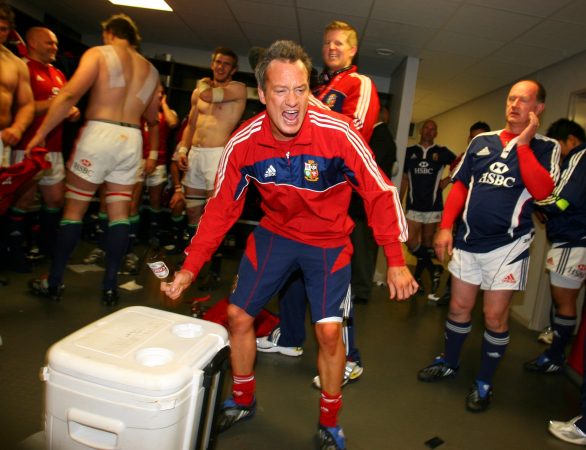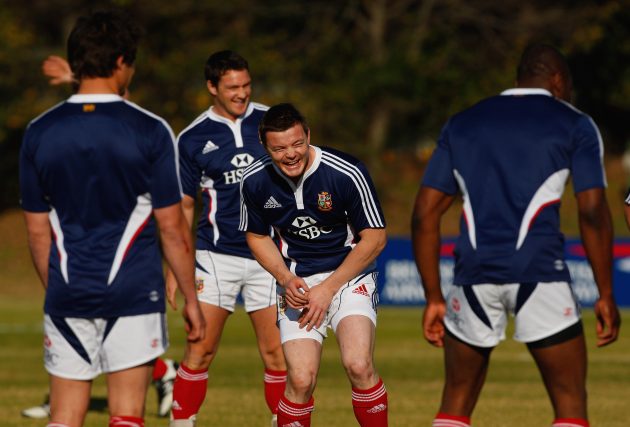As events like Lions tours feel increasingly like life or death, we celebrate the comedians
The role of the team joker in rugby
HAVE YOU heard the one about the British & Irish Lions team bus after a body-breaking session?
“There’s one incident I remember from the tour in 2009,” says Simon Shaw. “We’d just had a major contact session and the forwards were shot to bits. Everyone was lacking in energy, massively. Then Bobby (conditioning coach Paul Stridgeon) puts on some soundtrack and goes berserk. Dancing down the aisles and whatnot. We’re going, ‘What the hell?!’
“But by the end of it the whole bus, including the coaches, was rocking. We arrived at the hotel and we all went, ‘Sod this, let’s go round again!’ We spent another 20 minutes on the bus, banging the windows and having a great time.
“It’s within some people to be a massive influence, even if you think they’re not as serious. They bring something special.”

Big character Paul Stridgeon in action (Inpho)
In an age of one-percenters and edges in the face of stifling pressure, maybe people who man the release valve are elite sport’s most undervalued assets.
So let’s all hail the joker. That special character – whether it’s an athlete or coach – who can break the ice, nudge the floodgates, get a dressing room roaring, and send a whole bus shaking.
In an elite career that spanned the Nineties right through to the mid 2010s, Shaw has seen characters come and go. We saw him lurching around a court session on the 1997 Lions tour, tearing through 2009 and a renaissance in Toulon. He gives credit to ‘Marmite’ Mark Regan and madcap Andy Powell for boosts they gave some teams with their antics.
And of figures like Stridgeon, Shaw says: “They are absolutely crucial. They’re the dividing line between the coaches, and also like a shoulder to cry on, someone to share your thoughts with, but also an invigorator, an energiser from one day to the next.”
There’s a significance here. Warren Gatland, Lions boss for the upcoming South Africa tour, recently said that looking after players’ mental wellbeing on a Covid-disfigured trip will be crucial.
After naming his coaching staff, Gatland said of the downtime on tour: “It’s going to be challenging. I’ve spoken to the coaches about things they did in the Six Nations to keep players entertained and there are a lot of good ideas coming to us. Teams had card nights, games nights, pool games, golf simulators, different food nights. It’s different things to keep some sense of normality and alleviate some issues of boredom.”

Mike Phillips shares a laugh in 2013 (Getty Images)
But is the role of joker so important to factor into the talk of bubbles?
Dr Chris Wagstaff is reader in applied psychology at Portsmouth University and is immersed in organisational sports psychology. He explains: “It’s both anecdotal and in the literature. (Joker) is considered an informal role, which has contrast with formal leadership roles, like the captain or vice-captain.
“So although it’s informal, the person who sits in that team comedian role would still have some expectations around them. Maybe even a line on where ‘banter’ sits, things like that.
“The academic literature talks about those informal roles being defined by three things. Firstly, there’s the degree to which they’re active. So, what’s their activity, and how do those activities or behaviours stand them out from the rest of the team? How ‘deviant’ (different from the norm) are they, essentially.
“The second part would be the ability to fulfil the role. In a team comedian, it’s making people laugh or contributing something socially. And the third part is their likability, to the degree that they contribute to better group dynamics, how they improve the atmosphere within the team.
“If you nail those three things, your influence is likely to go up because it’s a type of leadership, being that team comedian. And if you’re not nailing those and are underperforming, then your status would be reduced and you’d potentially become deviant in a negative way. So you’d be detracting.”

Alan Quinlan and Doug Howlett share a laugh (Inpho)
Sometimes language around group dynamics has been crudely reduced to talk of subtractors and sappers, boosters and ‘good blokes’ without further scrutiny. Of course, in the fast-paced world of (largely blokey) sport, do we need to get bogged down with labels or what the academics have decided the right nomenclature is? Do we even need to discuss it outside selection rooms?
Well, Lions boss Ian McGeechan did in 2009. When the Munster flanker Alan Quinlan was selected to tour, despite not being a regular for Ireland, the veteran coach said he’d “have quite a big impact on the environment and the character of the squad as it evolves”.
In the end Quinlan received a lengthy ban that put a bullet in his tour hopes. But today he reflects on being name-checked as an energiser for the tour said to revive the Lions legacy after a haunted 2005 trip to New Zealand.
“Was it a case of me going and being part of a midweek team that was gonna try and rally the troops and have fun?” Quinlan wonders alongside Rugby World. “I was always pretty outgoing and got on well with people and liked to have fun. I was never a big drinker – the opposite in fact – but I was a messer and a joker. I love to have fun with people and have conversations.
“So maybe that was some part of it. I’d like to think that I was playing pretty well and could offer (something on the pitch), you know! But that was a nice thing as well. Because the history of summer tours with national teams, and particularly with the Lions, is about uniting people and coming together.”
Tours of rugby duty are as much about making memories as they are results. One of Quinlan’s fondest recollections from rugby abroad came in 2008, after a hectic summer when Munster’s Ireland stars went from a Heineken Cup triumph to a national tour Down Under. Next stop was Boston, USA. It was Munster’s pre-season, weights and conditioning were at the front of the mind, as well as continuing momentum from a successful season. And there was jet-lag to wrestle with. So when hooker Frankie Sheahan suggested the non-playing group went to a sports bar for a few beers, it may have felt like an unnecessary excursion.
What followed, Quinlan says, was “one of the most memorable nights ever”. Not because it was wild (Quinlan says they were likely all tucked up before 1am) but because they laughed, sang, told stories and enjoyed each other’s company.
Quinlan was hesitant at first, being focused on the next day’s training. But what will always stick with him is when former All Black Doug Howlett told him that while he does remember a few of the bigger games he’d played, he probably remembered as many of the good team-bonding moments. Psychologically, Quinlan says, successful teams need to balance the intense times with the light-hearted.

Mather and the Barbarians, 2017 (Getty Images)
Reading those moments right is a skill, says Wasps Ladies coach Giselle Mather. She recalls one pre-season camp, when the team were on their way to another venue after canoeing down a river, and came across a rope swing on the riverbank. Could they really afford the hour delay to let the athletes cut loose? For Mather, it was a total no-brainer: “We got on with it and it was amazing.”
But Mather has also weighed up the value of personas in a tight window, having coached and selected for the Barbarians women. What’s the trade-off?
“If you’ve got a couple of characters in there who make people laugh, that can add perspective, that’s a massive thing. The Lions do a lot of training but there’s also a heck of a lot of downtime, and part of the beauty of the Lions is getting to know other people. It’s about mixing the English, Scots, Irish and Welsh into one team as quickly as possible.
“With the Barbarians it’s even quicker, because the most you get is maybe two weeks together. It’s about getting to know people, enjoying each other’s company and playing the best style of rugby you can. People that find perspective through humour, that can create stories and make memories – which after all that is what touring is all about – they’re absolutely invaluable.”
But if there’s a 50-50 call on two players for a squad, and one’s raw but has a big personality and the other is more polished but serious, who wins?
“The dynamic of people makes it or breaks it,” Mather says. “It’s not the Lions tour, it’s the people on tour. It’s not a rugby team, it’s the people in that team. You can have the best facilities in the world and God knows what else, but it just doesn’t work; then you can have an environment with backs against the wall, with hardly a bean between them, and you go, ‘Oh my God, look at that group.’
“If it’s a 50-50 thing, without question you look at the personality of the person. And sometimes it’s more than a 50-50. If you get someone who connects people, brings new perspectives, makes stories, makes memories in an appropriate way, they’re worth their weight in gold.”

Warren Gatland sports a clown nose, 2017 (Getty Images)
Dr Wagstaff has done work on subsets and cliques, and is aware of the dangers of trying to control so many little details. He laughs that young athletes have a very keen nose for ‘organised fun’ too.
Ultimately, he says, the informal roles within any successful team tend to get filled organically. A rotating cast of characters can take on a comedian role and when someone gets it wrong, oh boy does it bomb. Pressure to perform can be exhausting too – studies show that putting on a performance to display emotions you do not feel is really tiring.
But if you have a number of individuals who naturally display that comedic touch, with likability and authenticity, what a boost it can give. Pick a side based purely around performance, and without any natural entertainers, and it’s the selectors who become the clowns.
This feature first appeared in the June 2021 issue of Rugby World.
Can’t get to the shops? You can download the digital edition of Rugby World straight to your tablet or subscribe to the print edition to get the magazine delivered to your door.
Follow Rugby World on Facebook, Instagram and Twitter.





